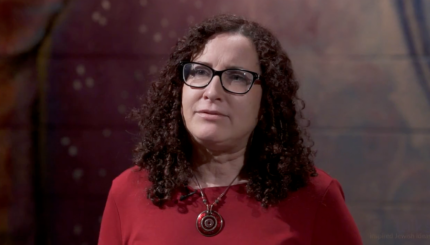Reprinted with permission from the Encyclopedia of Jewish Magic, Myth, and Mysticism (LlewellynWorldwide).
An incantation or spell is a spoken word, phrase, or formula of power, often recited as part of a larger ritual, which is recited in order to effect a magical result. Most cultures have some idea about words having supernatural constructive powers, but nowhere is this belief stronger than in Judaism.
Both the Bible and Jewish mysticism emphasize that God created the universe by means of a series of “speech acts.” Humanity is the only one of God’s mortal creations with the power of speech, implying that our words can, under certain conditions, have the same constructive (and destructive) power.
Underlying Beliefs
Jewish belief in the efficacy of spells, or “constructive language,” is premised on three assumptions:
1) There is special power inherent in the names of God.
2) There is special power in the words and phrases that God speaks, i.e., the words of the Torah and the Hebrew Bible.
3) The Hebrew alphabet itself is supernatural in origin, which means that using Hebrew letters in certain combinations is a source of special power, even when it has no semantic value to the adept.
Kinds of Spells
Spells may be either “theurgic” or “magical” in character. Usually,the belief underlying the use of theurgic spells is that God has in some way delegated that power/authority to the adept.
Truly magical incantations, by comparison, are “autonomous”; they do not involve spiritual entities at all. Often a magical spell or incantation is simply addressed to the object to be influenced. Thus, a truly magical incantation most closely parallels the word power of God Himself.
Incantation phrases are also a form of “heightened speech,” not unlike poetry. As such, there are a number of distinctive stylistic features present in incantations. These can include: repetition, rhythm, reversals, nonsense words, foreign words, and divine names of power.
Repetition,usually done three or seven times, or by another number symbolically relevant to the issue at hand, is the premier aspect of constructive words of power (Shabbat 66b, in the Talmud). Thus we find a teaching in the Talmud, for example, that reciting a verse containing the phrase “Voice of the Lord” seven times thwarts evil spirits at night.
Backwards Reduction
An incantation meant to undo the effects of a given event or phenomenon will often include elements of reversal, reciting a word or phrase backwards in some fashion. An example would be this one for dislodging a bone in the esophagus:”One by one, go down, swallow/swallow, go down, one by one.”
In Pesahim 112b (in the Talmud), we read that one afflicted with an ocular disease should recite the word shabriri (blindness) repeatedly in the phrase “My mother has cautioned me against shabriri. With each repetition, the speaker should reduce one letter from the word: shabriri, shabrir, shabri, shabr,shab, sha… The magical ritual of reducing the word is intended to yield a parallel reduction in the severity of the illness.
Speaking “Nonsense”
Spells can include rhymed or nonsense phrases that have minimal or no semantic value (vocesmysticae). Rather, rhythmic meaningless arrangements of words and phrases are used for the illocutionary or mantra-like effect, or for a sympathetic result, or because these words are understood to be meaningful to heavenly powers, if not the adept.
For example,to fend off an evil water spirit, the Talmud recommends intoning this: “Lulshafan anigeron anirdafon, I dwell among the stars, I walk among thin and fat people (Pesahim 112a).” While the second clause of this spell is strange enough, the first clause of the spell is neither Hebrew nor Aramaic; by all indications it is just gibberish. This feature, common to Greco-Roman magic, emerges in Jewish circles in late antiquity.
Akin to nonsense phrases, incantations often include nomina barbara, the use of foreign words and phrases. This feature of Jewish spells goes back to the Babylonian tradition of using archaic Sumerian words in their incantations, and becomes characteristic of Jewish incantations by the Greco-Roman period. With the later decline of Hebrew and Aramaic as a spoken language, these languages themselves become lingua magica for many spell-casters, both Jewish and gentile. Rashi (medieval French commentator) explains that an integral part of spell-casting involves reciting words that maybe incomprehensible to the enchanter (commentary to Sotah 22a).
What’s In A Name?
The use of names of power is a pervasive aspect of all Hebrew/Jewish spells. The names of God, angels, the righteous dead, even one’s mother, are considered critical to giving an incantation efficacy (Shabbat 66b). Often the names are encrypted in atbash form (an ancient letter substitution code,”mirroring” the Hebrew alphabet) or in other occult methods.
Spells from late antiquity are often promiscuous in the powers they invoke, freely mixing Jewish and pagan entities. One Greco-Egyptian spell calls upon”First angel of (the god), of Zeus, Iao, and you Michael, who rule heaven’s realm, I call, and you, archangel Gabriel. Down from Olympus, Abrasax,delighting in dawns, come gracious who view sunset from the dawn.”
Rabbinic Views
Magical incantations that appear in the Talmud (and are therefore presumably sanctioned by at least some sages) mostly serve the functions of healing and protection. In Tractate Shabbat 67a-b, one sage gives explicit sanction to the use of magic if it is done solely for the purposes of healing. Outside the talmudic/midrashic tradition proper, there are spells for summoning angels, love spells, and”binding” spells intended to curse or thwart a rival in love,business, or other personal matters.
While rabbinic authorities have never endorsed the latter forms of incantations, they are more tolerant of spells that enhance goals the sages endorse, such as healing, or spells meant to enhance the learning of Torah. These latter two types are perhaps the most common in Jewish literature.
Tolerance for the use of spells can also be regional. The Babylonian Talmud preserves several examples of spells (see especially tractates Pesahim, Shabbat, and Berakhot), while the Palestinian Talmud has virtually none. We know that at least some Jews in Palestine engaged in spell-casting, because we have magical texts from that region and period.
Evidently, the difference between the two Talmuds reflects something of the respective”official” attitude among the sages of those regions toward spell-craft.
Spells in Medieval Judaism
The types of incantations recorded continue to expand in number and variety of purpose throughout the Middle Ages. In theurgic manuals like the Book of theResponding Entity, there appear an increasing number of spells based on astrological power (what Renaissance adepts would dub “natural magic”).
In expressly magical texts, like Sefer Raziel, there appear incantations to”receive all desire.” These spells often completely parallel gentile magic,involving magical materials, fire and water, invoking the names of governing angels, and throwing something of value with magical names and phrases inscribed on it into the proper element (fire, seas, etc.). Treasure-locating spells also appear in medieval magical manuals.
What status many of these spells had in “normative” Jewish circles is hard to judge. Again, spells recorded in the works of later religious authorities tend to be limited to the same areas tolerated by talmudic authorities:incantations for better memorizing Torah, invoking an angel or ibbur (a usually beneficent spiritual possession of a living body), and for protection against medical or supernatural misadventure.
With your help, My Jewish Learning can provide endless opportunities for learning, connection and discovery.
Shabbat
Pronounced: shuh-BAHT or shah-BAHT, Origin: Hebrew, the Sabbath, from sundown Friday to sundown Saturday.
Talmud
Pronounced: TALL-mud, Origin: Hebrew, the set of teachings and commentaries on the Torah that form the basis for Jewish law. Comprised of the Mishnah and the Gemara, it contains the opinions of thousands of rabbis from different periods in Jewish history.
Torah
Pronunced: TORE-uh, Origin: Hebrew, the Five Books of Moses.



